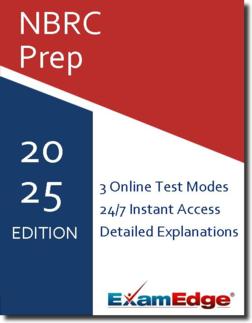NBRC Exam & NBRC Certification Info
The National Board for Respiratory Care (NBRC) is a non-profit organization that offers voluntary credentialing examinations for respiratory care practitioners. They provide certifications that are recognized worldwide as a quality standard for respiratory care professionals.
Step 1: Eligibility and Application
Before taking an NBRC certification exam, you must meet certain eligibility requirements. These typically include a minimum amount of education and/or work experience in the field of respiratory care. Once you've determined that you're eligible, you can apply for the exam on the NBRC website. The application process includes filling out an online form and paying an application fee.
Step 2: Scheduling the Exam
After your application has been approved, you will receive an email from the NBRC with instructions on how to schedule your exam. Exams are administered by a third-party testing company called PSI. You can schedule your exam on the PSI website, where you can choose the date, time, and location that works best for you.
Step 3: Taking the Exam
On the day of your exam, you should arrive at the testing center at least 15 minutes early. You will need to bring a valid, government-issued photo ID. The exam itself is computer-based and consists of multiple-choice questions. After you've completed the exam, your results will be available within a few weeks.
As for locations, PSI has testing centers across the United States. You can find a location near you by visiting the PSI website. For international candidates, the NBRC offers remote proctoring, which allows you to take the exam from the comfort of your own home.
For more information about the NBRC and their certification exams, you can visit their website at https://www.nbrc.org/.
NBRC - The National Board for Respiratory Care
NBRC Exams
The NBRC Certified Respiratory Therapist (CRT) certification test is a comprehensive examination designed to assess the knowledge and skills required to practice as a respiratory therapist. Administered by the National Board for Respiratory Care (NBRC), the test covers a wide range of topics including patient assessment, disease management, and respiratory care procedures. Successful completion of the CRT test demonstrates a candidate's professional expertise and readiness to provide high-quality respiratory care. The certification is recognized nationally and is often a prerequisite for advanced practice roles in the field.
Evaluate Data in the Patient Record
Perform Clinical Assessment
Perform Procedures to Gather Clinical Information
Evaluate Procedure Results
Recommend Diagnostic Procedures
TROUBLESHOOTING AND QUALITY CONTROL OF DEVICES, AND INFECTION CONTROL - 15%
Assemble / Troubleshoot Devices
Ensure Infection Prevention
INITIATION AND MODIFICATION OF INTERVENTIONS - 50%
Maintain a Patent Airway Including the Care of Artificial Airways
Perform Airway Clearance and Lung Expansion Techniques
Support Oxygenation and Ventilation
Administer Medications and Specialty Gases
Ensure Modifications are Made to the Respiratory Care Plan
Utilize Evidence-Based Practice
Provide Respiratory Care in High-Risk Situations
Assist a Physician / Provider in Performing Procedures
Conduct Patient and Family Education
The NBRC Registered Respiratory Therapist certification test is a comprehensive exam for professionals in the respiratory care field. Administered by the National Board for Respiratory Care, it assesses knowledge and competence in areas such as patient assessment, disease management, and therapeutic procedures. Candidates are evaluated on their ability to apply critical thinking and problem-solving skills in real-world clinical scenarios. Earning this certification demonstrates a high level of expertise, enhancing employability and potential for career advancement in respiratory care. It requires thorough preparation and deep understanding of respiratory therapy principles.
Evaluate Data in the Patient Record
Perform Clinical Assessment
Perform Procedures to Gather Clinical Information
Evaluate Procedure Results
Recommend Diagnostic Procedures
TROUBLESHOOTING AND QUALITY CONTROL OF DEVICES, AND INFECTION CONTROL - 15%
Assemble / Troubleshoot Devices
Ensure Infection Prevention
INITIATION AND MODIFICATION OF INTERVENTIONS - 50%
Maintain a Patent Airway Including the Care of Artificial Airways
Perform Airway Clearance and Lung Expansion Techniques
Support Oxygenation and Ventilation
Administer Medications and Specialty Gases
Ensure Modifications are Made to the Respiratory Care Plan
Utilize Evidence-Based Practice
Provide Respiratory Care in High-Risk Situations
Assist a Physician / Provider in Performing Procedures
Conduct Patient and Family Education

